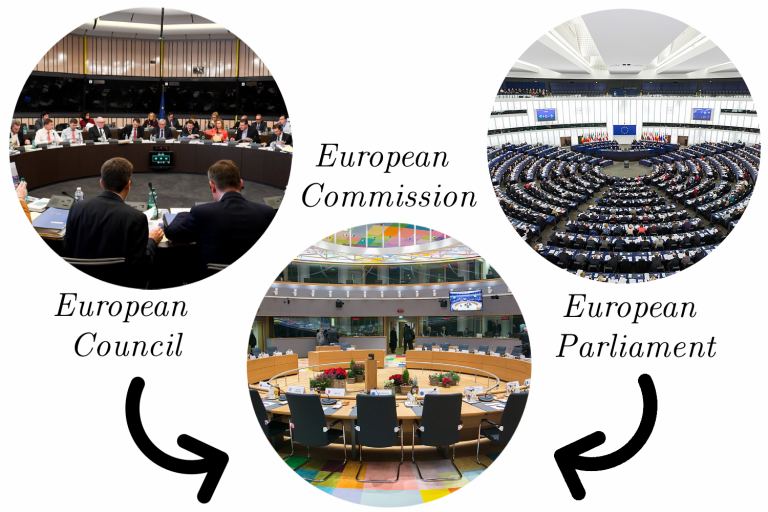Your guide to Euro-elections 201910 min read


We say: ‘European parliament elections’, and you probably say: ‘I’m out’. But here’s an annoying fact: this year’s EU elections are actually important, even if you’re against the EU. Perhaps especially if you’re against the EU. So take ten minutes of your time, get yourself a coffee, and give this headache a chance: Why do the ‘Euro-elections’ matter? What is at stake? Who can you vote for in May? An introduction to an election that isn’t as boring as it seems.
How does it work?
Yes, the institutional structure of the EU is quite a turn off when you want to spare your attention to EU politics. It is multifaceted and complicated, but here is what you need to know in a nutshell: The European Union has three important decision-making bodies: the Council, the Commission and the Parliament. The Council consists of all European leaders, yours including (if you are from the EU, that is). All these prime ministers and presidents decide which laws from the EU should be passed.
Those EU laws mostly come from the Commission, which you can imagine as the European government. It’s led by the European Commission president: right now that’s Jean-Claude Juncker (check out this video if you want to know more about this love-him-or-hate-him-leader). Aside from President Juncker, there are 27 commissioners, one from each member state, and each commissioner is concerned with a specific policy area. They are basically ministers. For instance, just like your country has a minister of health, the European Commission has its own commissioner of health. But who are going to be our commissioners? And who becomes the European Commission president? Are you voting for that?
Kind of. The Council, that group of national leaders, has to agree who becomes the president and who’s joining the president in the Commission. But the Parliament has to approve the Commission too! If a majority of the Parliament disapproves of the new Commission (or European government) proposed by the Council, then a new ‘government’ has to be formed.

So what do you vote for?
You vote for your favourite European parliament member. That’s important for two reasons. First of all, the Commission president and the commissioners that will be in office for five years have to be approved by the parliamentarians. Also, there is more to our power: every bill, every law, every decision that the Commission makes has to be approved by the European Parliament too. For instance, if the Commission president wants to forbid French cheese for some odd reason, and the heads of state of every member state have agreed to get rid of that stinky fromage, it still has to be approved by a majority of the European parliament members. So as long as we vote wisely, Parliament will never stop our favourite smelly cheese from entering supermarkets.
So who should you vote for?
That we can’t answer for you. But we can tell you what to watch out for. One way to go is to treat these elections as your national elections: vote for your favourite national party. But you should know this: in Brussels, national parties belong to bigger European party alliances. This means that your favourite national party is likely to vote in Brussels along with its alliance. In other words, many parties vote nationally very different than on a European level. So here’s some advice we can’t emphasise enough: know your alliances! Here’s an overview of all of them, with links that show you which of your national parties belong to which alliance.
[expand title=”European People’s Party (EPP)”]
In coalition with the Juncker Commission.
IN ONE SENTENCE: Conservative Centre-right, Christian, and pro-EU.
HOW MANY SEATS TODAY? 218/751
WHAT DO THE POLLS SAY? 175/705
STRENGTH: Diversity. From Merkel to Orbán – the EPP managed to unify all right-wing parties that support more European integration.
WEAKNESS: Diversity. What do Merkel and Orbán share aside from the EPP? Not much. The EPP became hard to govern for its internal tensions and likely faces a big loss of seats, though not enough to lose.
Presidential candidate for the Commission: Manfred Weber. A pragmatist who aims to bridge those clashing camps within the EPP. Some say he’s a bit too pragmatic and lacks ideals himself.
See which national parties belong to the EPP.[/expand]
[expand title=”Socialists and Democrats (S&D)”]
In coalition wtih the Juncker Commission.
IN ONE SENTENCE: Leftist enough to be socialist, centrist enough to love the EU.
HOW MANY SEATS TODAY? 190/751
WHAT DO THE POLLS SAY? 149/705
STRENGTH: A clear message. The S&D wants a social Europe: a stronger EU with responsibilities similar to a welfare state.
Weakness: The ‘S-word’. Socialism may sound to some Western Europeans like a hopeful message, but to many Central and Eastern Europeans it triggers bad memories.
Presidential candidate for the Commission: Frans Timmermans. Visionary, not so pragmatic and Weber’s main antagonist. Known for his strong criticism against Central European nationalist governments.
See which national parties belong to the S&D.[/expand]
[expand title=”European Conservatives & Reformers (ECR)”]
Opposition
IN ONE SENTENCE: The EU: It’s fine, but less is even better.
HOW MANY SEATS TODAY? 76/751
WHAT DO THE POLLS SAY? 65/705
STRENGTH: Connector. While the EU is divided by leavers and remainers, the ECR can serve as a negotiator. The ECR is in favour of the EU, but not so much of further political integration.
WEAKNESS: Euroscepticism. Like the British Tories, who are ECR-members, its alliance disagrees on the meaning of ‘less Europe’ and ‘Euroscepticism’, leading to internal instability.
Presidential candidate for the Commission: Jan Zahradil. A pro-NATO Czech Eurosceptic, helped lead the break-up of Czechoslovakia. You can tell he has a thing for decentralisation.
See which national parties belong to the ECR.[/expand]
[expand title=”Alliance of Liberals & Democrats”]
In coalition with the Juncker Commission.
IN ONE SENTENCE: Free-market and the European Union: The more, the merrier.
HOW MANY SEATS TODAY? 68/751
WHAT DO THE POLLS SAY? 96/705
STRENGTH: Trendy. Leftists are losing ground, while liberals are winning in Europe. Both in West and East, liberals are increasingly identified as the enemies of Euroscepticism.
WEAKNESS: Ambiguity. What is it to be liberal in Europe? Does it mean to be a conservative free-marketeer in Flanders (OpenVld) or a progressive LGBT-activist in Slovakia (PS)?
Presidential candidate for the Commission: Guy Verhofstadt and seven other candidates, AKA Team Europe. To keep it brief, ALDE doesn’t like that the biggest party present gets to pick the president. Probably, they’ll never be the biggest anyway.
Scroll down to ‘the parties’ to see which national parties belong to ALDE.[/expand]
[expand title=”The Greens”]
Opposition
IN ONE SENTENCE: Climate change – One Union, One Problem.
HOW MANY SEATS TODAY: 52/761
WHAT DO THE POLLS SAY: 56/705
STRENGTH: Their one-issue program. Sure, the Greens are about more than green politics. But their ecological agenda is always dominant, which makes them recognisable.
WEAKNESS: Their size. Size does matter in the parliament, especially in the world’s second biggest. It’s unlikely that the Greens will become a major force in Brussels any time soon.
Presidential candidate for the Commission: Bas Eickhout & Ska Keller. The Greens traditionally move forward two candidates, this time a Dutchman and a German, to encourage internal party debate.
Go to ‘party’ to see which national parties belong to the Greens.[/expand]
[expand title=”The European United Left (GUE)”]
Opposition
IN ONE SENTENCE: The far-left and the EU: how to Marx a neoliberal project.
HOW MANY SEATS TODAY: 52/761
WHAT DO THE POLLS SAY: 48/705
STRENGTH: The cool left. Europe’s moderate left is in tough waters, often illustrated as model elitists. The far-left could take advantage of this, offering a fresh alternative to leftist voters.
WEAKNESS: Its EU stance. GUE has a long tradition of ambiguity towards Brussels. The idea of uniting nations under a common cause fits Marxism, but EU’s capitalist character doesn’t.
Presidential candidate for the Commission: Violeta Tomič & Nico Cué. One is a controversial Bosnian-Slovenian actress, the other a hard-line Belgian trade-unionist.
See which national parties belong to GUE.[/expand]
[expand title=”Europe of Freedom & Direct Democracy (EFDD)”]
Opposition
IN ONE SENTENCE: Leaving the EU in the name of the people.
HOW MANY SEATS TODAY: 41/761
WHAT DO THE POLLS SAY: 40/705
STRENGTH: Common cause. The EFDD, as the alliance of populists, are a group of diverse ideologies. But the common cause makes this no problem: they all want to leave the EU as soon as possible.
WEAKNESS: The far-right. The EFDD isn’t the only anti-EU group. By offering a clear ideology to Europeans, far-right colleagues are snapping off seats from the EFDD.
Presidential candidate for the Commission: Nigel Farage. Unfortunately for Europhiles, he’s the parliamentarian with the most YouTube views. As the face of Brexit, he is a leading figure in anti-EU populism.
See which national parties belong to EFDD.[/expand]
[expand title=”Europe of Nations and Freedom (ENF)”]
Opposition
IN ONE SENTENCE: Leaving the EU in the name of the nation.
HOW MANY SEATS TODAY: 37/761
WHAT DO THE POLLS SAY: 63/705
STRENGTH: Trending. Unlike the EFDD, the far-right ENF has become increasingly popular by offering a radical alternative vision of Europe: a Europe of independent (ethnic) nations.
WEAKNESS: Isolation. The ENF doesn’t have many friends in Brussels. This makes it almost impossible to make deals and influence decision-making.
Presidential candidate for the Commission: Marcel de Graaff & Nicolas Bay. Dutchman De Graaff embodies the nationalist-libertarian wing, while Bay, a French Catholic, leads the traditional one.
Click here to see which national parties belong to ENF.[/expand]
Which alliances are governing the member-states nationally today?
.png)
Which alliances are likely to win the EU elections if held today?



Still interested?
Congrats on making it to the end of this article! You may now call yourself an informed European voter, or at least more informed than most European voters.
Interested in what issues are hijacking this year’s elections? Then get yourself ready for our next piece, coming to you next week. As the EU continues to be a diverse community, its issues are diverse too. To understand the dynamics between European parties, a minimum understanding is needed of the different events hijacking the national and European politics today. We’re talking Greece’s left-wing crisis, Poland’s polarisation, Italy’s new nationalism and Finland’s rise of socialism, just to name a few. Stay tuned!
Still not sure who to vote for? Here are some helpful sites: This EuroVote test tells which European alliance fits the best to you. Your vote matters shows how your favourite parliamentarians have voted on key-decisions in the past years. The MEP ranking reveals how often they voted and whether they showed up at all.
Jules Ortjens is a student of Political Science who is pursuing his Master’s degree in EU-Russia Studies in Tartu (Estonia) and Moscow. Currently, he is working for Dutch newspaper Trouw in the national parliament in the Hague. Jules writes primarily about European politics and how it is interpreted in different countries.
Ceren Kaya is pursuing her Master’s degree in EU-Russia studies at Tartu University, after completing her studies in International Relations in Izmir, Turkey. Her main research interests are migration studies, Turkish diaspora in Europe and EU politics. She also worked in organizations on gender equality and women’s socioeconomic and political representation in Turkey.




